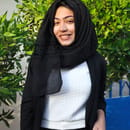When she was 16-years-old, Raven Lacerte and her father Paul went out hunting for moose, an annual ritual she and her family completed every year.
After they returned from their hunt, Raven and her family had skinned the hide and cut up to approximately 25, 000 pieces of moose hide.
She and her sisters had hand-written index cards with information about domestic violence and handed them out to people in their community. This idea would spark the beginning of a national grassroots movement that would grow rapidly in just one decade of advocacy.
Lacerte, whose family are Carriers from the Lake Babine Nation in B.C., lives not too far from Highway 16, which is known and often referred to as the Highway of Tears.
Like many families in that area, Raven and her family were impacted by the losses and violence in their community and wanted to do something to bring greater awareness to the issue.
“We wanted to do something where we could invite men into this space,” says Lacerte, who is now 26 and a mother to two-year-old daughter, Cedar.
Paul, co-founder of Moose Hide and father to Raven, already had experience doing advocacy work with the National Association of Friendship Centres, an organization dedicated to providing off-reserve services and programs to help urban Indigenous residents transition from rural to city life.
“I was always raised to help our people, and to use this time that we have on this earth to leave it better than it was when we got here,” says Raven. “This just came as a natural thing in my mind, as a visibly indigenous woman, the chances of something really bad happening to me are way higher.”
“There are so many women’s organizations that support women. We wanted to do something where we created a space for men to join us.”
The Moose Hide campaign is an Indigenous-led grassroots movement that is run by Raven and her family.
Rather than writing placards at their dining room table, through the course of a decade they have assembled a staff of 15 helping them run their campaign and have as of now handed out over 2 million Moose Hide pins across the country.
The Moose Hide campaign has grown into a national movement composed of Indigneous and non-Indigneous men who commit to honouring and respecting women and children within Indigenous communities and across Canada.
By wearing the Moose Hide pins, people are encouraged to spread information about the movement. The pins also come with a placard attached so that people who ask about the pins engage in meaningful dialogue that is centred on violence perpetrated towards women and children.
“We wanted to create space to say – this is what I experienced in my life and this is my path of healing, that I’m putting in for the foreword, and trying to make that positive change.”
By sharing the pins and placards, whether it’s in person or through social media, the goal of the campaign is to ensure that Canadians across the country are educated on and discussing the issue of domestic violence.
To participate in the campaign, simply go to the Moose Hide website and place an order for a bundle of pins! It’s a free and great way to get started in supporting the campaign.
“We’re in over 2,000 communities now across the country that have started their own Moose Hide campaigns,” says Lacerte. But their campaign doesn’t just end there, as Moose Hide encourages them to partake in a number of initiatives to spread awareness.
“We just support the communities in the way that they need,” she says. “It means creating a men’s group or organizing a fast when we do our fasts, or if it’s a walk-a-thon so that they can raise awareness.”
Moose Hide also provides an open source educational platform for students from kindergarten to grade 12 to access as a way of encouraging free and accessible education to everyone.
“We have different areas that we’ve been working in and trying to make systemic change,” says Raven. “We’re working with the tops of organizations to grassroots people trying to start their own campaign. We’re everywhere in between.”
With the arrival of COVID-19 however, many of their events have been moved online, including their 10 year anniversary celebration and fast.
But the movement hasn’t slowed down and Raven affirms how important it is to continue advocating for women especially now during the pandemic.
Now more than ever, women and children suffering from domestic violence are at a greater risk thanks to COVID-19. People are unable to seek help or leave their partners to current health regulations.
“Home is the most dangerous place sometimes,” says Lacerte. The amount of violence that is happening in homes right now is insane. There’s a huge spike.”
That is why it is important to encourage men and boys to join the movement, to ensure that there is an open and honest dialogue about domestic violence and what it means to be a man.
“It’s amazing to be able to hear people say how [the campaign] saved my life or it’s giving me a tool to help raise my boys in a way where they know what it’s like to be a strong, healthy man,” says Raven.
What sets Moose Hide apart from other campaigns is not just the pins, the placards, and its various roles with different organizations. It is about reaffirming what it means to be a man in a setting free of toxic masculinity and, at its core, loving and respecting women.
“And now that I have my own daughter, [Cedar], I want to do everything I possibly can to make sure that she lives a life free of violence, and where she just has nothing but opportunity.”



